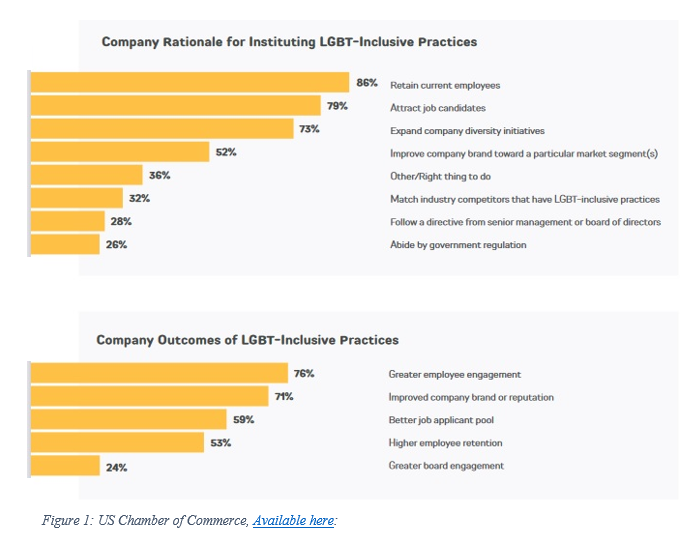Politics and LGBT+ Inclusion

Last time, we discussed the immediate changes of pronouns and discrimination bans that were made when President Biden took office, how they may impact you, and how they may impact your social media and marketing, as well as your hiring postings and process. Today, let's look at a change that focuses on training.
USA Today reported that "Joe Biden reversed his predecessor's diversity training ban that restricted the federal government and its contractors from using curriculum that examined systemic racism, white privilege and other race and gender bias issues." President Biden stated that this was done as a way to bridge the ever-widening gaps amongst the American people, stating, "Unity and healing must begin with understanding and truth, not ignorance and lies." Some debate whether there was a need to end the ban or whether discussing the ban is too political to be wise in the workplace.
Here's the reality: Many debate what should be able to be taught in the federal workplace, and the original ban prevented trainings on race or gender inclusion. The removal of the ban means these trainings can now occur.
How Does This Impact My Business?
On the surface, it might not. If your company is not federally funded, the ban and the rescinding of the ban did not change anything. However, the ban created much conversation about racial and gender inclusion training in the workplace. That conversation sparked again when the ban was ended. This means that your current and potential future employees may be discussing this. It means that your current and potential future customers or clients may be discussing this. It also means you may want to have an answer for where your company stands on these policies, including whether inclusion trainings are occurring either within your organization or as part of the hiring or onboarding process.
What's In It For Me?
At a time of COVID, when everyone is already exhausted, plus political exhaustion, plus too much to do with seemingly too few resources, why should anyone care about inclusion training (regardless of the banning or unbanning of policies)? Gender inclusion training includes the LGBT+ community (also known as the sexual and gender minorities community).
When we think about the impact to a company, these images make it easy for us to see just how many layers of interest are impacted by inclusion.
In addition, customers and clients are looking to support organizations that are inclusive! Forbes has reported on how one company is doing this, with a focus on racial inclusion. "Target CEO Brian Cornell: 'Our whole leadership team also prioritizes visits to guest homes for one-on-one interviews to help understand their needs and intimately understand their experience with our brand. We call these conversations Guest Immersions. For example, our guests told us that they wanted to see our doll assortment be multi-cultural in skin tone, and now we offer a variety of skin tone options for dolls. Feedback from our guests, no matter which channel it comes through, is imperative in delivering on Target's purpose to help all families experience the joy of everyday life.'" Target took something they were already doing (selling dolls) and added an element of inclusion by listening to their guests and thinking about who is being left out, then fixing the problem by adding to their doll assortment.
Putting It To Work
What can you do for your business when it comes to leveraging the news of the removal of the inclusion training ban? Now is a great time to start thinking! Use the news wave to capture the eyes and thoughts of those talking about this political change and make it work to your marketing advantage! Maybe you want to use your social media to share upcoming programming on inclusion within your workplace. Maybe you choose to post online that you are seeking recommendations for inclusion trainers. Maybe you are using your platforms to link to a survey in which you ask your customers questions so you can find ways to improve. Another option is to consider using your social media accounts for a takeover. A social media takeover is when a company or individual allows someone to literally take over their account for a period of time, using it to talk about the social justice issue that the person taking over is an expert in.
For example, Vox reported that, "On June 10, 54 Black women took over the Instagram accounts of 54 white women for the day as part of Share the Mic Now, a campaign aimed at amplifying Black women's voices. Political analyst Zerlina Maxwell took over Hillary Clinton's account, Black Lives Matter co-founder Patrisse Cullors took over Ellen DeGeneres' and Endeavor CMO Bozoma Saint John took over Kourtney Kardashian's. The Black participants had a total of 6.5 million followers on their personal accounts, while the white women had 285 million. The campaign vastly expanded their reach."
If you have a significant social media presence, you may want to consider participating in such actions in the future or even just allowing a gathering of employees interested in LGBT+ inclusion and/or racial inclusion to have a regular column or e-mailed newsletter for your employees and on your company website. By being open about how you include marginalized communities in your workplace and in your company's mission, you invite society to see how you are a part of it, doing good for the world, not just trying to do well for yourself.
In Solidarity.
Click the social buttons to share this story with colleagues and friends.
The opinions expressed here are the author's views and do not necessarily represent the views of MediaVillage.com/MyersBizNet.



